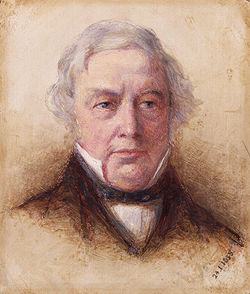Great Throughts Treasury
This site is dedicated to the memory of Dr. Alan William Smolowe who gave birth to the creation of this database.

Thomas Love Peacock
English Novelist, Poet and Official of the East India Company
"To assert that the unfortunate must necessarily have been imprudent, is to furnish an excuse to the cold-hearted and illiberal selfishness of a state of society, which needs no motive superadded to its own miserable marrow-mindedness, to produce the almost total extinction of benevolence and sympathy. Good and evil fortune depend so much on the combinations of external circumstances, that the utmost skill and industry cannot command success; neither is the result of the most imprudent actions always fatal: ?Our indiscretions sometimes serve us well, when our deep plots do pall.? {Hamlet., V. ii.].""
"To chase the clouds of life?s tempestuous hours, to strew its short but weary way with flow?rs, new hopes to raise, new feelings to impart, and pour celestial balsam on the heart; for this to man was lovely woman giv?n, the last, best work, the noblest gift of Heav?n."
"To reconcile man as he is to the world as it is, to preserve and improve all that is good, and destroy or alleviate all that is evil, in physical and moral nature--have been the hope and aim of the greatest teachers and ornaments of our species."
"Truth to nature is essential to poetry. Few may perceive an inaccuracy: but to those who do, it causes a great diminution, if not a total destruction, of pleasure in perusal. Shakespeare never makes a flower blossom out of season. Wordsworth, Coleridge, and Southey are true to nature in this and all other respects: even in their wildest imaginings."
"Well, my dear, I think most opinions worth maintaining have an authority of about that age."
"We wither from our youth; we gasp with unslaked thirst for unattainable good; lured from the first to the last by phantoms?love, fame, ambition, avarice?all idle, and all ill?one meteor of many names, that vanishes in the smoke of death."
"We are all born to disappointment. It is as well to be prospective. Our happiness is not in what is, but in what is to be. We may be disappointed in our everyday realities, and if not, we may make an ideality of the unattainable, and quarrel with Nature for not giving what she has not to give. It is unreasonable to be so disappointed, but it is disappointment not the less."
"Very well, said King Arthur; and for the present, illuminate Bedevere with your art, to assist him in procuring us a supper, for none of us has eaten anything since we were killed."
"What do we see by [our enlightened age] which our ancestors saw not, and which at the same time is worth seeing? We see a hundred men hanged, where they saw one. We see five hundred transported, where they saw one. We see five thousand in the workhouse, where they saw one. . . We see children perishing in manufactories, where they saw them flourishing in the fields. We see prisons, where they saw castles. We see masters, where they saw representatives. In short, they saw true men, where we see false knaves. They saw Milton, and we see Mr. Sackbut."
"You are a man of taste, Mr. Crotchet. A man of taste is seen at once in the array of his breakfast-table. It is the foot of Hercules, the far-shining face of the great work, according to Pindar's doctrine: archomenou ergou, pros¢pon chr‚ themen telauges. The breakfast is the pros¢pon of the great work of the day. Chocolate, coffee, tea, cream, eggs, ham, tongue, cold fowl,--all these are good, and bespeak good knowledge in him who sets them forth: but the touchstone is fish: anchovy is the first step, prawns and shrimps the second; and I laud him who reaches even to these: potted char and lampreys are the third, and a fine stretch of progression; but lobster is, indeed, matter for a May morning, and demands a rare combination of knowledge and virtue in him who sets it forth."
"When Scythrop grew up, he was sent, as usual, to a public school, where a little learning was painfully beaten into him, and from thence to the university, where it was carefully taken out of him; and he was sent home like a well-threshed ear of corn, with nothing in his head."
"When I open the bottle, I shut the book of Numbers. There are two reasons for drinking: one is, when you are thirsty, to cure it; the other, when you are not thirsty, to prevent it. The first is obvious, mechanical, and plebeian; the second is most refined, abstract, prospicient, and canonical. I drink by anticipation of thirst that may be. Prevention is better than cure. Wine is the elixir of life. 'The soul,' says St. Augustine, 'cannot live in drought.' What is death? Dust and Ashes. There is nothing so dry. What is life? Spirit. What is spirit? Wine."
"You are a man of taste, Mr. Gryll. That [large sirloin of beef] is a handsomer ornament of a dinner-table than clusters of nosegays, and all sorts of uneatable decorations."
"You are welcome to laugh if it so please you. None shall laugh in my company, though it be at my expense, but I will have my share of the merriment. The world is a stage, and life is a farce, and he that laughs most has most profit of the performance. The worst thing is good enough to be laughed at, though it be good for nothing else; and the best thing, though it be good for something else, is good for nothing better."